
Updated: Feb. 11, 2025 (Initial publication: May 20, 2023)
Publications

.🌐follow Marie-Anne Frison-Roche on LinkedIn
🌐subscribe to the Newsletter MAFR Regulation, Compliance, Law
____
 ► Full Reference: M.-A. Frison-Roche, General Procedural Law, prototype of Compliance Obligation, Working Paper, June 2023 (updated in February 2025).
► Full Reference: M.-A. Frison-Roche, General Procedural Law, prototype of Compliance Obligation, Working Paper, June 2023 (updated in February 2025).
____
🎤 This working paper was drawn up as a basis for the presentation "Droit de la Compliance et Droit processuel" ("Compliance Law and General Procedural Law") at the colloquium on 13 June 2023, , and then completed for publication.
____
📝It is therefore also the basis for the written contribution, "The General Procedural Obligation, prototype of the Compliance Obligation", in the book to be published Compliance Obligation
____
► Working Paper summary: At first glance, General Procedural Law seems to be the area least concerned by the Compliance Obligation, because if the person is obliged by it, mainly large companies, it is precisely, thanks to this Ex Ante, in order to never to have to deal with proceedings, these path that leads to the Judge, that Ex Post figure that in return for the weight of the compliance obligation they have been promised they will never see: any prospect of proceedings would be seeming to signify the very failure of the Compliance Obligation (I).
But not only are the legal rules attached to the Procedure necessary because the Judge is involved, and increasingly so, in compliance mechanisms, but they are also rules of General Procedural Law and not a juxtaposition of civil procedure, criminal procedure, administrative procedure, etc., because the Compliance Obligation itself is not confined either to civil procedure or to criminal procedure, to administrative procedure, etc., which in practice gives primacy to what brings them all together: General Procedural Law (II).
In addition to what might be called the "negative" presence of General Procedural Law, there is also a positive reason, because General Procedural Law is the prototype for "Systemic Compliance Litigation", and in particular for the most advanced aspect of this, namely the duty of vigilance (III). In particular, it governs the actions that can be brought before the Courts (IV), and the principles around which proceedings are conducted, with an increased opposition between the adversarial principle, which marries the Compliance Obligation, since both reflect the principle of Information, and the rights of the defence, which do not necessarily serve them, a clash that will pose a procedural difficulty in principle (V).
Finally, and this "prototype" status is even more justified, because Compliance Law has given companies jurisdiction over the way in which they implement their legal Compliance Obligations, it is by respecting and relying on the principles of General Procedural Law that this must be done, in particular through not only sanctions but also internal investigations (VI).
____
🔓read the developments below⤵️

Oct. 11, 2024
MAFR TV : MAFR TV - Overhang
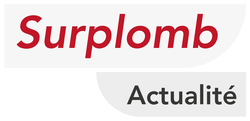
🌐suivre Marie-Anne Frison-Roche sur LinkedIn
🌐s'abonner à la Newsletter MAFR. Regulation, Compliance, Law
🌐s'abonner à la Newsletter Surplomb, par MAFR
____
► Référence complète : M.-A. Frison-Roche, "L'extension du domaine de la CJIP par la voix de la connexité : la CJIP Nestlé Waters du 2 septembre 2024", in série de vidéos Surplomb, 11 octobre 2024
____
🌐visionner sur LinkedIn cette vidéo de la série Surplomb
____
____
🎬visionner ci-dessous cette vidéo de la série Surplomb⤵️
____
Surplomp, par mafr
la série de vidéos dédiée à la Régulation, la Compliance et la Vigilance
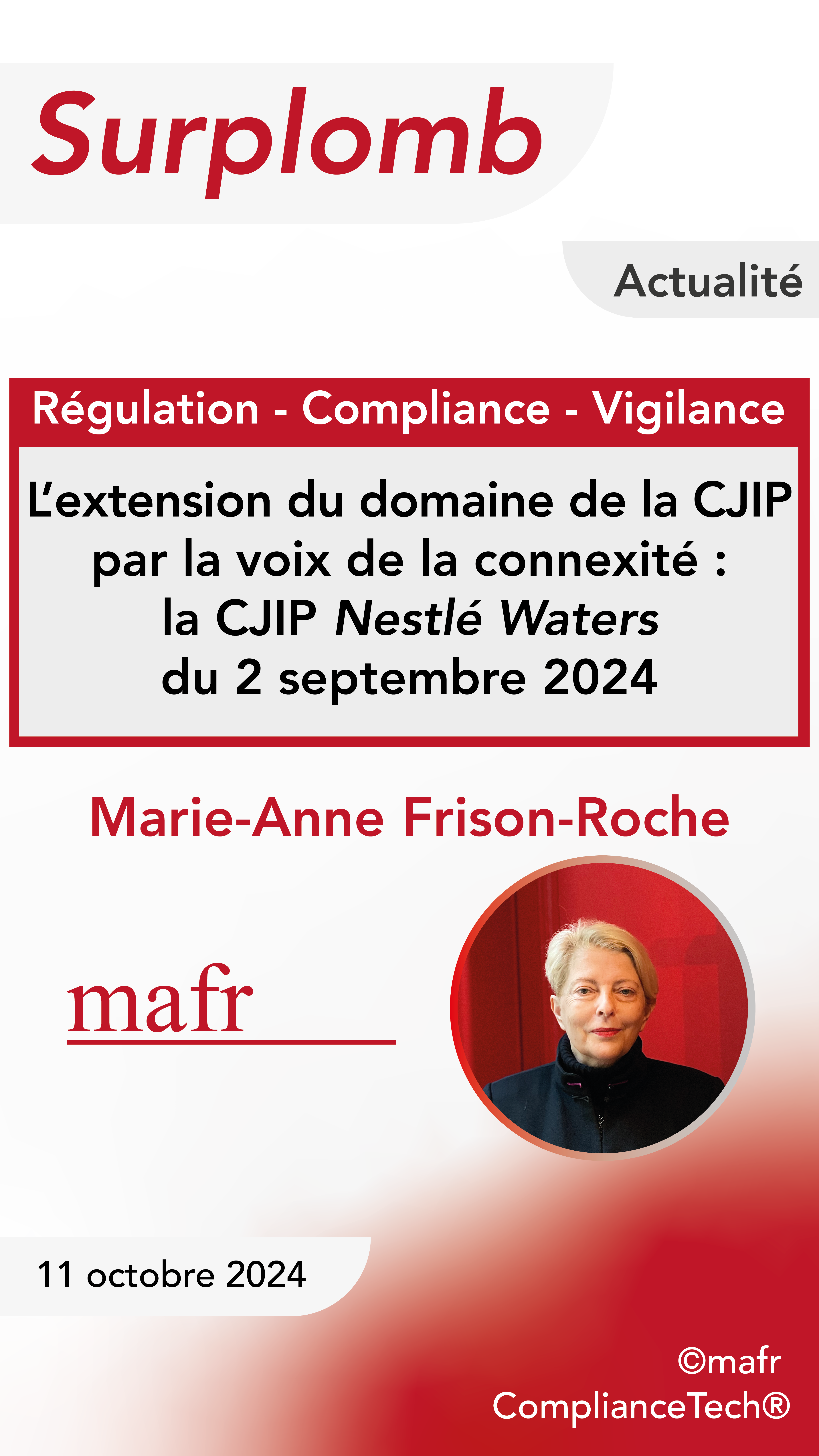

Feb. 8, 2024
Thesaurus : Doctrine

► Référence complète : Th. Baudesson, "L'évolution des rapports entre avocats et autorités de poursuites depuis l'introduction de la CJIP", in M.-A. Frison-Roche et M. Boissavy (dir.), Compliance et droits de la défense. Enquête interne – CJIP – CRPC, Journal of Regulation & Compliance (JoRC) et Dalloz, coll. "Régulations & Compliance", 2024, sous presse.
____
📕consulter une présentation générale de l'ouvrage, Compliance et droits de la défense. Enquête interne – CJIP – CRPC, dans lequel cet article est publié
____
► Résumé de la contribution (résumé fait par le Journal of Regulation & Compliance - JoRC) : L''auteur estime que la CJIP, évolution la plus marquante de la procédure pénale, fait dialoguer le Barreau et les autorités de poursuite, qui passent d'une logique de confrontation à la coopération. Il s'agit d'une relation d'un type nouveau. Le Procureur concerné est avant tout le PNF qui bénéficie d'une expertise en la matière qu'il diffuse par sa soft law et apporte plus de sécurité aux entreprises.
Il illustre ses propos notamment par la CJIP dite Airbus dans laquelle il y eut confrontation avec les pratiques anglaises et américaines dans des "enquêtes de coopérations" qui requièrent une confiance réciproque. Mais il reconnaît les progrès qui restent à faire, aussi bien du côté des avocats qui en France semblent demeurer comme par principe en opposition aux magistrats et peu sensibles à ce qui pourrait être leur rôle dans la recherche de la vérité, que du côté des magistrats qui semblent percevoir les avocats comme des sortes de "mercenaires" dont il faudrait par principe se méfier. C'est pour cela que dans leur guide sur les enquêtes internes l'AFA et le PNF demandent que l'avocat qui mène l'enquête et celui qui assure la défense pénale de l'entreprise ne puisse pas être le même, ce que l'auteur explique par cette défiance, présumant des enquêtes de complaisance, suspicion de principe que l'auteur regrette. De la même façon, le refus des magistrats de reconnaître le secret professionnel couvrant le rapport d'enquête paraît à l'auteur archaïque par rapport aux conceptions anglo-saxonnes, car le DOJ comme le SFO admettent aisément le legal privilege attaché à ce rapport. De ce fait, la France ne serait pas au même niveau d'État de Droit que les États-Unis et le Royaume-Uni.
L'auteur en conclut que des progrès restent donc à faire pour que la France achève son évolution pour devenir pleinement attractive pour que des entreprises qui, confrontées à des pratiques répréhensibles, soient effectivement menées à entreprendre une démarche d'auto-révélation.
____
🦉Cet article est accessible en texte intégral pour les personnes inscrites aux enseignements de la Professeure Marie-Anne Frison-Roche
________
Jan. 17, 2024
Thesaurus : Doctrine

► Référence complète : J. Karsenti, "Défendre les intérêts des victimes dans la justice pénale économique négociée", in M.-A. Frison-Roche et M. Boissavy (dir.), Compliance et droits de la défense. Enquête interne – CJIP – CRPC, Journal of Regulation & Compliance (JoRC) et Dalloz, coll. "Régulations & Compliance", à paraître.
____
📕consulter une présentation générale de l'ouvrage, Compliance et droits de la défense - Enquête interne, CIIP, CRPC, dans lequel cet article est publié
____
► Résumé de l'article (fait par le Journal of Regulation & Compliance - JoRC) : L'article débute par une présentation générale de la naissance de la justice pénale négociée que l'auteur rattache avant tout à une volonté d'efficacité, alors que la justice ne devrait pas se négocier et que la culpabilité se prouve et ne se transige pas. Mais le flux du contentieux et sa gestion en a décidé autrement, avec la révolution de la CRPC, puis de la CJIP. Celle-ci met aussi la France aux standards internationaux qui pèsent et bénéficient aux entreprises, personnes morales, l'ensemble mettant au cœur de la procédure pénale ces modes alternatifs de poursuite.
La nature de plus en plus économique de ces procédures propres aux grands acteurs économiques internes est qu'ils sont seuls face aux procureurs dont la seule autorité règne de fait, l'article posant que ni le juge ni les victimes ne sont véritablement présents. Ce jugement sévère de l'auteur se radicalise concernant la CJIP. Ce peu de place est reproché par l'auteur aussi bien concernant les personnes physiques, notamment les mandataires sociaux des personnes morales, que les victimes des agissements de ceux-ci, les personnes morales susceptibles de défendre les intérêts des victimes ayant peu d'accès et peu de droits. Il en résulte une indemnisation aléatoire des victimes.
Cette justice négociée serait donc à front renversé avec la procédure pénale ordinaire qui, elle, s'ouvre de plus en plus aux victimes.
____
🦉Cet article est accessible en texte intégral pour les personnes inscrites aux enseignements de la Professeure Marie-Anne Frison-Roche
________
June 14, 2023
Conferences
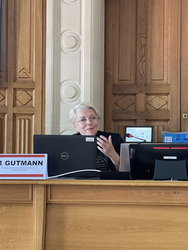
♾️follow Marie-Anne Frison-Roche on LinkedIn
♾️subscribe to the Newsletter MAFR Regulation, Compliance, Law
____
► Full Reference: M.-A. Frison-Roche, "Compliance et droit processuel" ("Compliance and Procedural Law"), in B. Deffains, M.-A. Frison-Roche and J.-B. Racine (dir.), Journal of Regulation & Compliance (JoRC) and University Panthéon-Assas (Paris II), Compliance : Obligation, devoir, pouvoir, culture (Compliance : obligation, duty, power, culture), University Panthéon-Assas, Salle des Conseils, 14 June 2023.
____
🧮See the full programme of this event
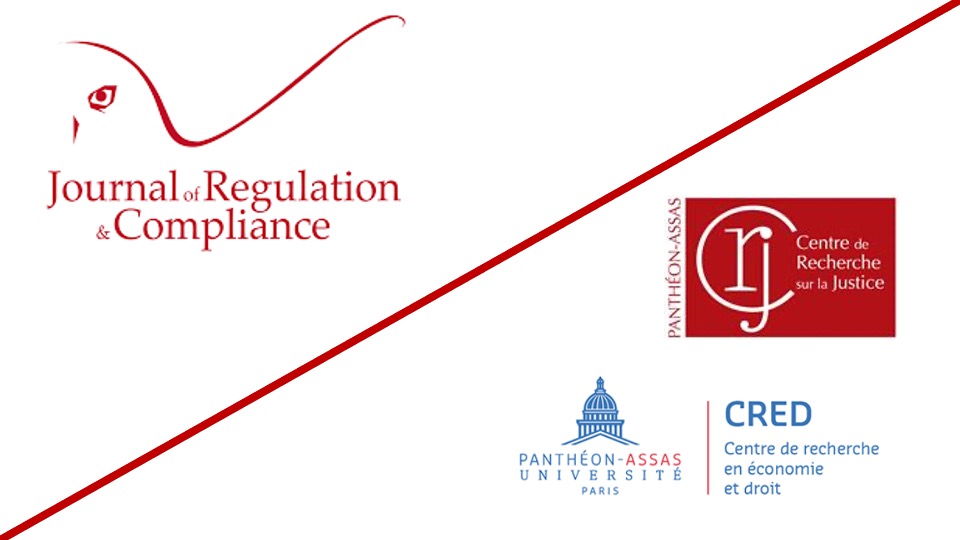
____
🎤see the other speech made during the first day of this symposium : "L'obligation de compliance, entre volonté et consentement : obligation sur obligation vaut" ("Compliance Obligation, between will and consent: obligation on obligation works")
____
► Summary of the conference: After referring to the chapter in the book Compliance Jurisdictionalisation, which deals more specifically with Procedural Law
The first development relates to the fact that the relationship between Compliance Law and Procedural Law is very difficult because it is often said that they simply have nothing to do with each other, or that they have everything to dislike each other. This is because Compliance is often reduced to processes, and to the mechanical place that algorithms could take in it, in taking care of everything.
Compliance would even have the purpose and effect of ensuring that the company and its managers never come into contact with a judge, the public prosecutor being their best ally in this respect.
Secondly, I recalled the very common idea that Procedural Law is a kind of 'tribute' that the rule of Law demands, which certainly weighs down companies when compared with companies living in systems in which there's not not such a price.
But many stress that Procedural Law could become a model. This can be justified and technically anticipated because it has already happened in Regulation Law, and Compliance Law is the deployment of it
In the third stage, I worked on the alliance between the two, with the procedure (rather than the process) modifying compliance and thereby reinforcing it, evoking the way in which this can manifest itself technically
In the fourth step, I looked for what would be the "naturally appropriate procedure" for Compliance: one that takes into account the duration and the development of "solutions", to which the notion of "sustainability", which is central in the substantive Law of Compliance, refers.
In a fifth stage, and devoting more time to this, I have pointed out where innovation should be the strongest: the proof, the probatory obligation being the "part totale" ("total part") of the compliance obligation. This major issue will be the subject of a series of symposiums held in 2024.
________
See the articles that are part of the Second chapter of the book 🕴️M.-A. Frison-Roche (ed.), 📘Compliance jurisdictionalisation, 2023 :
- 🕴️N. Cayrol, 📝General Procedural Law in Compliance Law,
- 🕴️F. Ancel, 📝The procedural principle of compliance, a new trial leading principle?,
- 🕴️B. Sillaman, 📝Privilege and Cooperation: Procedural Lessons Learned from the U.S. for Global Application,
- 🕴️A. Linden, 📝Motivation and publicity of the decisions of the restricted committee of the French Personal Data Protection Commission (Commission nationale de l'informatique et des libertés-CNIL) in a compliance perspective,
- 🕴️S. Scemla and 🕴️D. Paillot, 📝The supervisory Authorities face difficulties to apprehend the Rights of the Defense,
- 🕴️M.-A. Frison-Roche, 📝Adjusting by the nature of things General Procedural Law to Compliance Law.
🕴️M.-A. Frison-Roche, 🚧From Regulation Law to Compliance Law, 2017.
🕴️M.-A. Frison-Roche, 🎤Le rôle du Juge dans le déploiement du Droit de la Régulation en Droit de la Compliance (The role of the Judge in the deployment of Regulatory Law in Compliance Law), in 🧮De la Régulation à la Compliance : quel rôle pour le Juge ?, 2023.
Notably in this perspective, 🕴️M.-A. Frison-Roche and 🕴️M. Boissavy, 📕Compliance et droits de la défense. Enquête interne - CJIP - CRPC (Compliance and Due Process. Internal Investigation - DPA), 2024.
May 11, 2023
Thesaurus : Doctrine
► Référence complète : M. Brenaut, "Les fonctions sans le statut : de quelques hypothèses où le parquetier se fait juge pénal", Droit pénal, n°5, mai 2023, p. 17-21.
____
► Résumé de l'article (fait par l'auteur) : "Le parquetier est-il devenu un juge pénal comme les autres ? La question posée par les professeurs Bonfils et Safi nous inspire une réponse en deux temps : oui, le parquetier ressemble à s'y méprendre à un juge pénal (juge d'instruction ou juge de condamnation), du moins si l'on considère certaines attributions qui lui sont désormais conférées ; non, il n'est pas, pour l'heure, un « juge comme les autres », au regard de son statut".
____
🦉Cet article est accessible en texte intégral pour les personnes inscrites aux enseignements de la professeure Marie-Anne Frison-Roche
________
April 20, 2023
Conferences
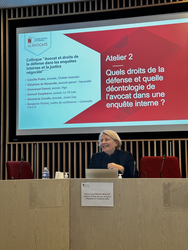
♾️ suivre Marie-Anne Frison-Roche sur LinkedIn
♾️s'abonner à la Newsletter MAFR Regulation, Compliance, Law
____
► Référence complète : M.-A. Frison-Roche, synthèses de chacune des 8 tables-rondes et synthèse finale, in Conseil National des Barreaux (CNB), L'avocat et les droits de la défense dans les enquêtes internes et la justice négociée, Paris, 20 et 21 avril 2023.
____
🧮Consulter le programme complet de cette manifestation
🧮Retrouver le programme dans lequel les vidéos sont insérées
📕Consulter une première présentation de l'ouvrage dirigé par Marie-Anne Frison-Roche et Matthieu Boissavy.
____
Dans la journée du 20 avril 2023
consacrée plus particulièrement aux enquêtes internes
🎥regarder le film de la première session, ayant pour thème : Des avocats dans les enquêtes internes : pourquoi, avec qui et avec quels outils ? cliquer ICI
____
🎥regarder le film de la deuxième session, ayant pour thème : Quels droits de la défense et quelle déontologie de l'avocat dans une enquête interne ? cliquer ICI
____
🎥regarder le film de la troisième session, ayant pour thème : Les enquêtes internes en matière sociale : cliquer ICI
____
🎥regarder le film de la quatrième session, ayant pour thème : Les enquêtes internes dans la lutte anti-corruption et pour le respect du devoir de vigilance : cliquer ICI (la synthèse porta à la fois sur cette 4ième session et sur l'ensemble de la journée)
________
Dans la journée du 21 avril 2023
consacrée plus particulièrement à la CJIP et à la CRPC
🎥regarder le film de la première session, ayant pour thème : Théorie et pratique de la négociation dans la justice pénale cliquer ICI
____
🎥regarder le film de la deuxième session, ayant pour thème : Le rôle du juge, du procureur, du justiciable et de l'avocat dans une CRPC et une CJIP cliquer ICI
____
🎥regarder le film de la troisième session, ayant pour thème : Combinaison des CRPC et des CJIP : enjeux, défis et perspectives cliquer ICI
____
🎥regarder le film de la quatrième session, ayant pour thème : Analyse comparative internationale de la justice négociée et prospective cliquer ICI
____
🎥regarder le film de la troisième session, ayant pour thème : Combinaison des CRPC et des CJIP : enjeux, défis et perspectives cliquer ICI
____
March 1, 2023
Interviews

♾️follow Marie-Anne Frison-Roche on LinkedIn
♾️subscribe to the Newsletter MAFR Regulation, Compliance, Law
____
► Full reference: M.-A. Frison-Roche, , F. Ancel, N. Roret, "Les juges vont être de plus en plus présents dans le droit de la compliance" ("Judges will be more and more involved in Compliance Law"), interview with Olivia Dufour, Actu-Juridique, 1st March 2023.
____
💬read the interview (in French)
____
► Presentation of the interview by the journal (in French) : "À l’instigation du professeur Marie-Anne Frison-Roche, l’École nationale de la magistrature (ENM) a proposé pour la première fois début février une formation en compliance à destination des magistrats et des avocats. François Ancel, conseiller la Cour de cassation, Nathalie Roret, avocate et directrice de l’ENM et Marie-Anne Frison-Roche plaident d’une seule voix pour le renforcement du rôle des acteurs judiciaires dans la compliance."
____
► Questions asked (in French):
- D’où est venue l’idée d’aborder ce droit en cours d’émergence qui semble encore très confidentiel ?
- En effet, on croit souvent savoir ce qu’est la compliance, en la confondant avec la conformité, pouvez-vous expliquer ce qui les distingue ?
- On constate, en lisant le programme de la formation, que toutes les branches du droit sont concernées par la compliance depuis le droit des sociétés jusqu’au pénal en passant par les contrats et la responsabilité. Pouvez-vous nous donner des exemples ?
- Comment se redistribuent les rôles entre les avocats, les juges et les entreprises dans cette nouvelle configuration qu’est la compliance ?
- En quoi est-ce important pour les magistrats d’appréhender ce nouvel univers ?
- Ces transformations sont-elles cantonnées à la compliance ou peuvent-elles sortir de son champ ?
- Par exemple qu’en est-il de la question très controversée du rôle de l’avocat à l’égard du juge ?
- Avez-vous constaté lors de cette formation une amélioration du dialogue entre les différents acteurs ?
- Cette formation va-t-elle être instituée de manière permanente dans la formation des magistrats et des avocats ? Une autre manifestation est-elle prévue ?
________
Feb. 2, 2023
Thesaurus : Doctrine

► Full Reference: B. Silliman, "Secret professionnel et coopération : les leçons de procédure tirées de l’expérience américaine pour une application universelle" ("Privilege and cooperation, procedural lessons learned from the U.S for global application"), in M.-A. Frison-Roche (ed.), La juridictionnalisation de la Compliance, coll. "Régulations & Compliance", Journal of Regulation & Compliance (JoRC) and Dalloz, 2023, p. 231-234.
____
📕read a general presentation of the book, La juridictionnalisation de la Compliance, in which this article is published
____
► English summary of the article (done by the Journal of Regulation & Compliance): The French legal system is evolving, organizing interaction between lawyers with regulators and prosecutors, especially in investigations about corruption or corporate misconduct, adopting U.S. negotiated resolutions such as the Convention judiciaire d'intérêt public, which encourages "collaboration" between them.
The author describes the evolution of the U.S. DOJ doctrine and askes French to be inspired by the U.S. procedural experience, U.S. where this mechanism came from. Indeed, the DOJ released memoranda about what the "collaboration" means. At the end (2006 Memorandum), the DOJ has considered that the legal privilege must remain intact when the information is not only factual to maintain trust between prosecutors, regulators, and lawyers.
French authorities do not follow this way. The author regrets it and thinks they should adopt the same reasoning as the American authority on the secret professionnel of the avocat, especially when he intervenes in the company internal investigation.
____
🦉This article is available in full text for those registered for Professor Marie-Anne Frison-Roche's courses
Feb. 2, 2023
Publications
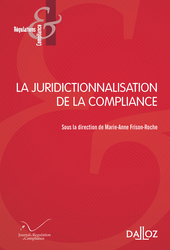
🌐 follow Marie-Anne Frison-Roche on LinkedIn
🌐 subscribe to the Newsletter MAFR Regulation, Compliance, Law
____
► Full Reference: M.-A. Frison-Roche (ed.), La juridictionnalisation de la Compliance, série "Régulations & Compliance", Journal of Regulation & Compliance (JoRC) and Dalloz, 2023, 490 p.
____
► Presentation of this book: Sanctions, controls, appeals, deals: judges and lawyers are everywhere in the Compliance mechanisms, creating unprecedented situations, sometimes without a solution yet available. Even though Compliance was designed to avoid the judge and produce security by avoiding conflict. This jurisdictionalisation is therefore new. Forcing companies to prosecute and judge, a constrained role, perhaps against their nature. Leading to the adaptation of major procedural principles, with difficulty. Confronting arbitration with new perspectives. Putting the judge at heart, in mechanisms designed so that he is not there. How in practice to organize these opposites and anticipate the solutions? This is the challenge taken up by this book.
____
📘 In parallel, the English version of this book, Compliance Jurisdictionalisation, is published in the series co-published by the Journal of Regulation & Compliance (JoRC) and Bruylant.
____
🧮 This book comes after a cycle of colloquia organised in 2021 by the Journal of Regulation & Compliance (JoRC) and its Academic Partners.
____
This volume is the continuation of the books dedicated to Compliance in the collection "Régulations & Compliance", founded and managed by Marie-Anne Frison-Roche, copublished by the Journal of Regulation & Compliance (JoRC) and Dalloz.
___
🏗️ General construction of this book:
The book begins by a double Introduction, the first (in free access) summarizing the book, the second, substantial, relating to the need to reinforce the Judge and the Lawyer to impose the Compliance Law as a characteristic of the Rule of Law.
The first Part is devoted to what is specific to Compliance Law. of Compliance: the transformation of companies into Prosecutors and Judges of themselves, even of others.
The second Part relates to Compliance general procedural Law, the procedure being the way between the dispute and the judgement.
The third Part continues this journey to the judge and aims to measure the influence of the reasoning and requirements of Compliance Law in dispute resolution methods where it was not, with some exceptions, present, but where it has a great future: Arbitration.
Because trial and judicial decision are inseparable, because legal techniques and the Rule of Law should not be divided but compliance techniques could paradoxically be the weapon of their dissociation, because the power to judge and the procedures surrounding the latter must not be dissociated, because therefore Compliance mechanisms and the Rule of Law must be thought out and practiced then, the rise in power of one must be the sign of the rise in power of the other, and not the price of the 'weakening of the Rule of Law, the fourth Part relates to the Judges in the Compliance mechanisms and culture.
____
► Read in free access the article: M.A. Frison-Roche, "Lignes de force de l'ouvrage La Juridictionnalisation de la Compliance" (Lines of Forces of the book La juridictionnalisation de la Compliance).
____
►Read below the summaries of each contribution of the book⤵️
Feb. 2, 2023
Editorial responsibilities : Direction of the collection "Regulations & Compliance", JoRC & Dalloz

♾️ follow Marie-Anne Frison-Roche on LinkedIn
♾️ subscribe to the Newsletter MAFR Regulation, Compliance, Law
____
► Full Reference: M.-A. Frison-Roche (ed.), La juridictionnalisation de la Compliance, série "Régulations & Compliance", Journal of Regulation & Compliance (JoRC) and Dalloz, 2023, 490 p.
____
► This book in few words: Sanctions, controls, appeals, deals: judges and lawyers are everywhere in the Compliance mechanisms, creating unprecedented situations, sometimes without a solution yet available. Even though Compliance was designed to avoid the judge and produce security by avoiding conflict. This jurisdictionalisation is therefore new. Forcing companies to prosecute and judge, a constrained role, perhaps against their nature. Leading to the adaptation of major procedural principles, with difficulty. Confronting arbitration with new perspectives. Putting the judge at heart, in mechanisms designed so that he is not there. How in practice to organize these opposites and anticipate the solutions? This is the challenge taken up by this book.
____
📘 In parallel, the English version of this book, Compliance Jurisdictionalisation, is published in the series co-published by the Journal of Regulation & Compliance (JoRC) and Bruylant.
____
📅 This book comes after a cycle of colloquia organised in 2021 by the Journal of Regulation & Compliance (JoRC) and its Academic Partners.
____
This volume is the continuation of the books dedicated to Compliance in this collection.
► Read the presentations of the other books on Compliance in this collection:
- further books:
🕴️M.A. Frison-Roche (ed.), 📕Le système probatoire de la compliance, 2025
🕴️M.A. Frison-Roche (ed.), 📕L'obligation de compliance, 2024
🕴️M.A. Frison-Roche et M. Boissavy (ed.), 📕Compliance & droits de la défense. Enquête interne - CJIP - CRPC, 2023
- previous books :
🕴️Frison-Roche, M.-A. (ed.), 📕 Les buts monumentaux de la Compliance, 2022
🕴️Frison-Roche, M.-A. (ed.), 📕 Les outils de la Compliance, 2020
🕴️Frison-Roche, M.-A. (ed.), 📕 Pour une Europe de la Compliance, 2019
🕴️N. Borga, N., 🕴️J.-Cl. Marin & 🕴️J.-Ch. Roda (ed.), 📕 Compliance : Entreprise, Régulateur, Juge, 2018
🕴️Frison-Roche, M.-A. (ed.), 📕 Régulation, Supervision, Compliance, 2017
🕴️Frison-Roche, M.-A. (ed.), 📕 Internet, espace d'interrégulation, 2016
📕 Read the presentations of the other titles of the collection.
____
► General presentation of the book: There have always been Judges and Lawyers in Compliance Law, because this branch of Law is an extension of Regulatory Law in which they have a core place. This results from the fact that the decisions taken in respect of Compliance are contestable in Court, including Arbitration, those issued by the Company, such as those of States or Authorities, the Judge in turn becoming what Compliance Law is effective.
The novelty lies more in the phenomenon of "jurisdictionalisation", that is the trial model penetrates all Compliance Law, and not only the Ex-Post part that it includes. Moreover, it seems that this jurisdictionalisation influences the non-legal dimension of Compliance. This movement has effects that must be measured and causes that must be understood. Advantages and disadvantages that must be balanced. If only to form an opinion vis-à-vis Companies that have become Prosecutors and Judges of themselves and others ...: encourage this "Jurisdictionalisation of Compliance", fight it, perhaps influence it? In any case, understand it!
___
🏗️ General construction of this book:
The book begins by a double Introduction, the first (in free access) summarizing the book, the second, substantial, relating to the need to reinforce the Judge and the Lawyer to impose the Compliance Law as a characteristic of the Rule of Law.
The first Part is devoted to what is specific to Compliance Law. of Compliance: the transformation of companies into Prosecutors and Judges of themselves, even of others.
The second Part relates to Compliance general procedural Law, the procedure being the way between the dispute and the judgement.
The third Part continues this journey to the judge and aims to measure the influence of the reasoning and requirements of Compliance Law in dispute resolution methods where it was not, with some exceptions, present, but where it has a great future: Arbitration.
Because trial and judicial decision are inseparable, because legal techniques and the Rule of Law should not be divided but compliance techniques could paradoxically be the weapon of their dissociation, because the power to judge and the procedures surrounding the latter must not be dissociated, because therefore Compliance mechanisms and the Rule of Law must be thought out and practiced then, the rise in power of one must be the sign of the rise in power of the other, and not the price of the 'weakening of the Rule of Law, the fourth Part relates to the Judges in the Compliance mechanisms and culture.
____
DOUBLE INTRODUCTION
🕴️M.-A. Frison-Roche, 📝Lignes de force de l'ouvrage La juridictionnalisation de la Compliance free access to the full text
🕴️M.A. Frison-Roche, 📝Conforter le rôle du Juge et de l'Avocat pour imposer la Compliance comme caractéristique de l'État de Droit
I. L'ENTREPRISE INSTITUÉE PROCUREUR ET JUGE D'ELLE-MEME ET D'AUTRUI PAR LE DROIT DE LA COMPLIANCE ("THE COMPANY ESTABLISHED PROSECUTOR AND JUDGE OF ITSELF AND OTHERS BY COMPLIANCE LAW")
🕴️M.-A. Frison-Roche,📝 Le "jugeant-jugé". Articuler les mots et les choses face à l'éprouvant conflit d'intérêts
🕴️C. Granier, 📝Réflexions sur l'existence d'une jurisprudence des entreprises
🕴️L.-M. Augagneur, 📝La juridictionnalisation de la réputation par les plateformes
🕴️A. Bruneau, 📝L'entreprise juge d'elle-même : la fonction compliance dans la banque
🕴️Lapp, Ch., 📝La compliance dans l'entreprise : les statuts du process
🕴️J. Heymann, 📝La nature juridique de la "Cour suprême" de Facebook
🕴️D. Latour, 📝Les enquêtes internes au sein des entreprises
🕴️A. Bavitot, 📝Le façonnage de l'entreprise par les accords de justice pénale négociée
🕴️S. Merabet, 📝La vigilance, être juge et ne pas juger
II. LE DROIT PROCESSUEL À L'OEUVRE DANS LE DROIT DE LA COMPLIANCE ("GENERAL PROCEDURAL LAW IN COMPLIANCE LAW")
🕴️N. Cayrol, 📝Des principes processuels en Droit de la Compliance
🕴️F. Ancel,📝Le principe processuel de compliance, un nouveau principe directeur du procès ?
🕴️B. Sillaman, 📝Secret professionnel et coopération : les leçons de procédure tirées de l’expérience américaine pour une application universelle
🕴️S. Scemla,🕴️D. Paillot, 📝La difficile appréhension des droits de la défense par les autorités de contrôle en matière de compliance
🕴️M.-A. Frison-Roche, 📝Ajuster par la nature des choses du Droit processuel au Droit de la Compliance
III. L'ARTICULATION DE LA COMPLIANCE ET DE L'ARBITRAGE INTERNATIONAL ("ARTICULATION BETWEEN COMPLIANCE LAW AND INTERNATIONAL ARBITRATION")
🕴️J.-B. Racine, 📝Compliance et Arbitrage. Essai de problématisation
🕴️E. Silva-Romero,🕴️R. Legru, 📝Quelle place pour la Compliance dans l'arbitrage d'investissement ?
🕴️C. Kessedjian, 📝L'arbitrage au service de la lutte contre la violation des droits de la personne humaine par les entreprises
🕴️M. Audit, 📝La position de l'arbitre en matière de compliance
🕴️J. Jourdan-Marques, 📝L’arbitre, juge ex ante de la compliance ?
🕴️E. Kleiman, 📝Les objectifs de la compliance confrontés aux acteurs de l’arbitrage
🕴️F.-X. Train, 📝Arbitrage et procédure parallèles exercées au titre de la compliance
🕴️Cl. Debourg, 📝La compliance au stade du contrôle des sentences arbitrales
IV. LE JUGE DANS LE DROIT DE LA COMPLIANCE ("THE JUDGE IN COMPLIANCE LAW")
🕴️M.-A. Frison-Roche, 📝Le juge, l'obligation de compliance et l'entreprise. Le système probatoire de la Compliance
🕴️J. Morel-Maroger, 📝La réception des normes de la compliance par les juges de l'Union européenne
🕴️S. Schiller, 📝Un juge unique en cas de manquement international à des obligations de compliance ?
🕴️O. Douvreleur, 📝Compliance et juge du droit
🕴️F. Raynaud, 📝Le juge administratif et la compliance
🕴️E. Wennerström, 📝Quelques réflexions sur la Compliance et la Cour européenne des droits de l'Homme
________
Dec. 24, 2020
Thesaurus : 02. Lois
Full reference: Loi n° 2020-1672 du 24 décembre 2020 relative au Parquet européen, à la justice environnementale et à la justice pénale spécialisée (Law of 24 December 2020 on the European Public Prosecutor's Office, environmental justice and specialized criminal justice)
Oct. 15, 2020
Thesaurus : Soft Law

Full reference: Serious Fraud Office, Operational Handbook about Deferred Prosecution Agreements, October 2020
July 26, 2018
Thesaurus : Doctrine
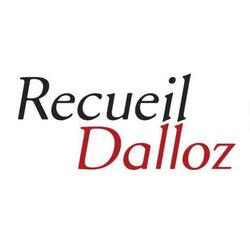
► Référence complète : : A. Couret, "Les figures du procureur privé", D.2018, chron., p. 1545 et s .
_____